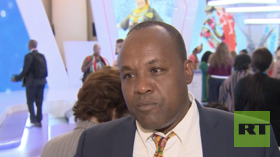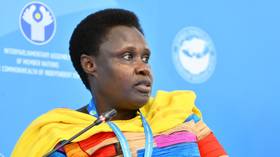BRICS a positive force for women – Ethiopian official

BRICS is a crucial platform for facilitating international cooperation on women’s leadership and social development, Asalifew Kabeto, an official from Ethiopia’s Ministry of Women and Social Affairs, has told RT.
Speaking on the sidelines of the Eurasian Women’s Forum 2024 (EAWF) in St. Petersburg, Kabeto highlighted the importance of BRICS as a space for emerging economies to collaborate and learn from one another.
“BRICS is an alternative platform to work together with different countries,” the official stated. “We have just shared different experiences from different countries on women, leadership, [and] women’s social development.”
The BRICS group was founded in 2006 by Brazil, Russia, India, and China, with South Africa joining in 2011. Two more African states, Ethiopia and Egypt, joined the group in January 2024, along with Iran and the United Arab Emirates. Russia currently holds the chairmanship of the group.
Raymond Matlala, chairman of the South African BRICS Youth Association, told RT of his commitment to fight for women’s rights, drawing inspiration from his upbringing and the women in his life. Raised by a single mother and surrounded by sisters and nieces, Matlala spoke about his desire to create a better future for the next generation of women, free from the struggles faced by their ancestors under colonization and apartheid in South Africa.
He emphasized the critical role of women as the “backbone” of communities. Matlala also highlighted Pretoria’s progress in gender equality, particularly in government. “In South Africa, it’s not a rule that is written, but it’s something the president has made that in cabinet, as well as in parliament, [there] must be at least 50% representation of women,” he noted.
This year, the EAWF has drawn over 2,000 participants, including 600 foreign guests from 126 countries and international organizations, according to Valentina Matvienko, head of the Russian Federation Council. Established in 2015 as a platform to promote female leadership, the forum is held every three years. This year’s event takes place from September 18 to 20.













